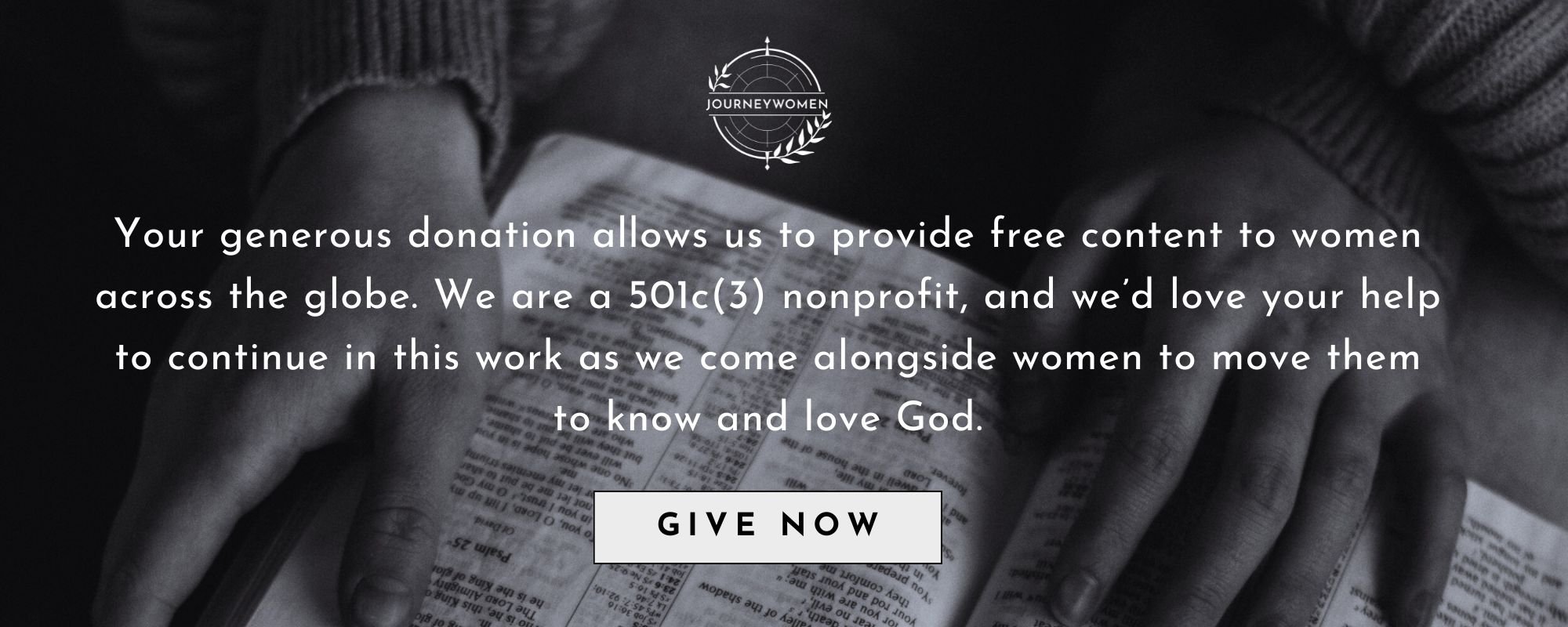Women with a Past with Dr. Sandra Glahn
On today’s episode of the Journeywomen podcast, I’m chatting with Dr. Sandra Glahn about women with a past. We revisited the sexualized, vilified, and marginalized women in the Bible. You’ll find this conversation a helpful tool for your own personal Bible study, and I think it’ll be an encouragement to you in your personal life as well. So you’ll know her a little better, Dr. Glahn is basically a baller--there’s no other way to put it, really. She teaches on-campus classes at Dallas Theological Seminary as well as an immersion course in Italy on Medieval Art and Spirituality and immersion courses in writing and in worship. Dr. Glahn is a multi-published author of both fiction and non-fiction, a journalist, and a speaker who advocates for thinking that transforms, especially on topics relating to art, gender, sexual intimacy in marriage, and first-century backgrounds as they relate to gender.
Dr. Glahn’s more than twenty books related to bioethics, sexuality, and reproductive technologies as well as ten Bible studies in the Coffee Cup Bible Study series. She is a regular blogger at Engage, bible.org’s site for women in Christian leadership, the owner of Aspire Productions, and served as editor-in-chief for Kindred Spirit from 2008 to 2016.
Can you tell us a little about who you are and what you do?
You mention in your book that there are numerous women in the Bible who have either been falsely accused or their actual sexual sin has been held against them like a scarlet A, when that sin was not even the point of the biblical writer. Who are some of the women in the Bible that you want to help us take a second look at? What are some examples of women that have been victimized as the victims of misguided conclusions in the Bible?
What do we miss out on when we read these stories incorrectly? What are some examples of poor applications we have drawn for ourselves from these stories?
What’s your best case for convincing us to lay aside our preconceived notions about some of the women you mentioned?
What is one of the biggest mistakes we make in attempting to understand biblical narratives?
What can we learn from their stories? Why should we re-examine them?
Do you have a favorite woman with a past that you’d like to share with us and help debunk the misconceptions we might unknowingly maintain?
What kind of questions can we ask when we approach the text to help us develop a more accurate understanding?
How do these women give us a better understanding of the gospel?
Do you have any encouragement for women who identify with the women in the Bible that have been misperceived? How can they share their own stories without fear and shame?
THREE QUESTIONS I ASK EVERY GUEST
What 3 resources would you recommend for someone who wants to grow in their understanding of the women in the Bible?
What are your 3 simple joys?
Who has had the greatest impact on your own journey with Jesus?
NOTEWORTHY QUOTES
“What if when we present the Gospel, we present it as ‘Jesus sees your pain. Jesus knows your suffering. Jesus knows everything, he’s God’. We have really missed his approach to people.”
“One of the dangers is coming to the Bible and saying ‘what does this say to me?’ We need to pull the camera back and say ‘who is the human author writing to and why?’”
“[In the story of David and Bathsheba] the message to the original audience is if David can fall that far, you are not above that. David is a man after God’s own heart.”
“What is timelessly relevant in this text?”
“The story of Rahab suggests that God always spares the one who is willing to believe.”
“God has a heart for the vulnerable. In Proverbs 31, there is a verse about speaking up for those who are voiceless. We need to value the voiceless, the homeless, the displaced.”
“Courage is for humans. Have courage sister because God is with you. ‘I am with you’ is one of God’s favorite things to say when people are facing difficulty.”
“It’s better for me to defend other people than myself.”
“We should never compare ourselves to one another. All of us and all of our stories are needed.”
“It’s absolutely essential that we tell our stories and often. Most of the time, our greatest point of ministry comes from our greatest point of pain.”
DR. GLAHN'S RESOURCES FOR WOMEN IN THE BIBLE
Read a whole book of the Bible in one sitting.
Listen to the Bible. Most of it was created to be heard.
Daughters of the Church by Ruth A. Tucker and Walter L. Liefeld
OTHER RESOURCES
Vindicating the Vixens by Sandra Glahn
Coffee Cup Bible Study Series by Sandra Glahn
DR. GLAHN'S SIMPLE JOYS
Traveling
Writing
The Beach
IMPORTANT NOTE
Journeywomen interviews are intended to serve as a springboard for continued study in the context of your local church. While we carefully select guests each week, interviews do not imply Journeywomen's endorsement of all writings and positions of the interviewee or any other resources mentioned.
Affiliate links used are used where appropriate. Thank you for supporting the products that support Journeywomen!
FOR MORE OF JOURNEYWOMEN
Subscribe: Apple Podcasts | Spotify
Follow Us: Instagram | Facebook
Support the podcast by writing a review

